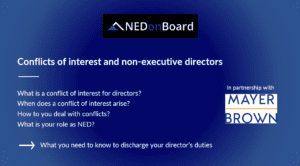Activist activity is ramping up as passive investors are becoming more active while the new Corporate Governance Code promote the engagement of boards with shareholders and other stakeholders. It is important for NEDs and board members to have adequate governance frameworks which are aligned with shareholders’ expectations and address potential deficit in governance. Inadequate frameworks are more likely to impair good board decision-making and boards with inadequate frameworks are more likely to be target of activism campaigns. In this blog, we review the key areas that are the primary attention of activist shareholders.
What the UK Corporate Governance and the Wates Corporate Governance Principles say:
Principle D of the Corporate Governance Code: “In order for the company to meet its responsibilities to shareholders and stakeholders, the board should ensure effective engagement with, and encourage participation from, these parties.
Provision 3 of the Corporate Governance Code: “In addition to formal general meetings, the chair should seek regular engagement with major shareholders in order to understand their views on governance and performance against the strategy. Committee chairs should seek engagement with shareholders on significant matters related to their areas of responsibility. The chair should ensure that the board as a whole has a clear understanding of the views of shareholders”.
Principle One – Purpose and Leadership of the Wates Principles: “All directors should promote the success of the company. Boards should have a clear understanding of the views of shareholders including those with a minority interest”.
Related posts: The new UK Corporate Governance Code
Key areas of attention
Activist campaigns primarily focus on the following themes:
- Excessive CEO remuneration. A number of UK FTSE companies have had to face rebellions from shareholders over the excessive remuneration of their CEOs. Example include Persimmon, Serco, Standard Chartered, Hammerson and Standard Life Aberdeen. A replay of the NEDonBoard board best practice® panel event on the topic of Remuneration Committee (24 September 2019) is available to NEDonBoard Members.
- Board composition and refreshment. Board composition is typically a starting point for activists or at least one of the attention points. Issues likely to be raised by activists are: lack of board refreshment, high average tenure of NEDs and lack of turnover of the NEDs or lack of diversity. L&G has stepped up action against firms with all-male boards and firms with few female board members. Coast Capital launched a campaign to unseat half of FirstGroup’s directors.
- Share price underperformance. Pernod Ricard has engaged with activist investor Elliott Management to improve profit margins, shareholder returns and governance.
- Conflicts of interests. In April 2018, Glass Lewis called on investors to vote against the re-election of Mr Hill as chair of Metro Bank. “We question the need for the company to engage in business relationships with its directors and their close relations” said Glass Lewis.
- New forms of activism. ESG and workplace issues will become areas of scrutiny.
Related posts: Board refreshment and succession planning
Not a member yet? Join your NED community and have access to the latest job opportunities, Events and Networking. You can sign up here.
Written by Elise Perraud




